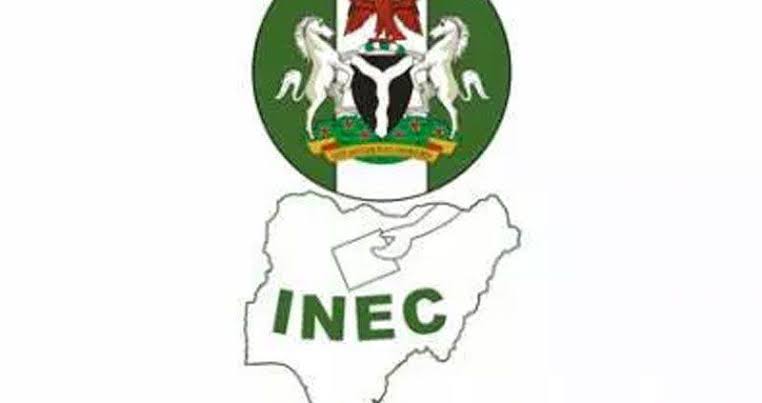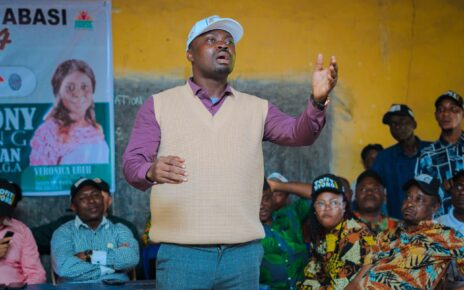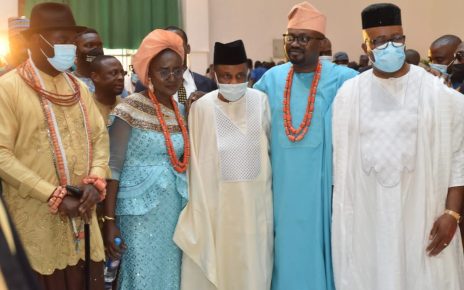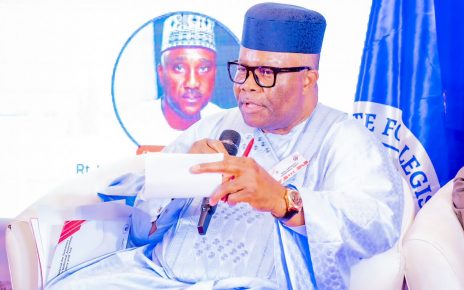*Insists there’s no tension in commission *RECs play quasi administrative role — Lawyers *As Buhari writes Senate, seeks confirmation of 19 nominees as INEC commissioners
National Commissioner and Chairman, Information and Voter Education Committee of the Independent National Electoral Commission, INEC, Festus Okoye, has declared that Resident Electoral Commissioners, RECs, were not recognised as members of INEC.
Okoye also made it clear that he is not aware of any tension in the commission nor between RECs and National Commissioners.
He made the disclosures, yesterday, on Channels Television morning programme, Sunrise Daily, in reaction to Vanguard’s lead story of Monday where it was revealed that underhand moves were being made at the commission’s national headquarters in Abuja to ensure the participation of some politicians who neither participated in party primaries nor were defeated.
The story also maintained that some RECs were not comfortable with disclosures from the election management body’s headquarters that the reports of party primaries monitored by RECs and, initially, given primacy, are being ignored.
But, while making some clarifications yesterday, Okoye insisted that the RECs were not members of INEC and, as such, could not appropriate collegiate powers in the affairs of the commission.
Laying the foundation for his thesis, Okoye said: “Let me just say this and say it very clearly and unequivocally: if you look at the constitution of Nigeria, which is the grundnorm, the commission is made up of the Chairman, who is the Chief Electoral Commissioner of the federation, and 12 National Commissioners. These are the ones that the constitution refers to as the commission.
“Now, RECs are not the commission. The powers given to National Commissioners and the chairman of the commission are delegated to the RECs. In other words, RECs operate in a delegated capacity. So, if we do not delegate powers to a REC, a REC will not have powers to act.
“Furthermore, when a REC is appointed, the chairman of the commission swears in the REC and the REC is assigned responsibilities by the commission. In other words, he goes to represent the commission, which is the chairman and the 12 National Commissioners.
“You also have Electoral Officers in the 774 LGAs of the federation. All of them carry out the intendment and carry out the functions of the commission as represented by the Chairman and the National Commissioners.”
Pressed further that the Third Schedule, paragraph 14 of the 1999 Constitution (as amended), says there shall be for each state of the federation and the Federal Capital Territory, Abuja, a Resident Electoral Commissioner, who shall be appointed by the president…. and that this is under the same section which talks about the body, INEC, as established, Okoye maintained that “you have to begin to read from paragraph 14 where it says INEC shall comprise the following members— A Chairman, who shall be the Chief Electoral Commissioner, and 12 other members to be known as National Electoral Commissioners; and then, in paragraph 15, it says the commission shall have powers to….
“They are not recognised as members of the commission. In Paragraph15(h), it says that the commission shall have powers to delegate any of its powers to any REC. That’s the point I’m making.
“The Constitution says the commission shall be the chairman and 12 National Commissioners and these commissioners shall have powers to delegate any of its powers to a REC. So, there is no dispute.”
On whether some RECs were not happy with developments surrounding publication of names of candidates who did not emerge from primaries monitored by the RECs in the states, the National Commissioner said he is not aware of any such discontent leading to tension.
“I’m not aware that any REC is complaining.
“But I’m trying to clarify issues relating to whether the commission is bound under any circumstance to accept the monitoring reports that have emerged from any REC. This is because if a REC has been directed by the commission to monitor a party primary and he has submitted a report and within the intervening period, there is a court order saying don’t accept that report emanating from the one the REC monitored, accept the report from a different primary, I’m saying that as a commission, we have the power and the right to take that decision without reference to the REC, who must have monitored that primary in question.”
RECs play quasi administrative role— Ufeli
Reacting to the development last night, constitutional lawyer and Executive Director, Cadrell Advocacy Centre, Evans Ufeli, said: “RECs are political appointees, even though their offices aren’t tenured to lapse with that of the president who appoints them.
‘’They play a quasi- administrative function by managing the political process in their respective states across the country.
“The implication of their status, therefore, is that their reports and/or policies with the state under their terms of reference can be overridden by the commission, especially where there’s a court order stating to the commission that their reports on an issue should not be implemented.
“A Resident Electoral Commissioner is not a regular member of INEC in that their statutory duties are not drawn as staff of INEC but as officers with a statutory authority to do specific assignment for the administrative enhancement and support of the body in the discharge of its responsibilities to the Nigerian state.”
RECs are not members of INEC — Prof Odinkalu
Similarly, former Chairman of National Human Rights Commission, NHRC, Prof. Chidi Odinkalu, said RECs were not members of INEC but failed to give details on the implication of this on the country’s electoral process.
Only National Electoral Commissioners are responsible for election credibility — Prof Erugo
Also, Professor Sam Erugo, SAN, said: “Mr. Okoye was simply re-stating the concise position of law on the point. INEC is a creation of statute; precisely, Section 153 (1)(f) of the 1999 Constitution of the Federal Republic of Nigeria, established INEC as a body for the federation. By reference to Part 1 of the Third Schedule to the Constitution, Section 153 (2) of the Constitution succinctly provides for the composition of INEC in the following words: ‘The Independent National Electoral Commission shall comprise the following members—(A) a chairman, who shall be the Chief Electoral Commissioner; and (b) 12 other members to be known as National Electoral Commissioners.’
“That provision goes on to state the qualifications of the members. Of course, that means that the Resident Electoral Commissioners are not members, though required to be appointed by the President under paragraph 3 of that provision of the schedule on composition. Essentially, the implication of this provision is that the INEC Chairman and National Commissioners are responsible for vital decisions regarding elections, and the conduct of elections in Nigeria. They are collectively accountable to Nigerians for the exercise.”
Buhari writes Senate, seeks confirmation of 19 nominees as INEC commissioners
Meanwhile, President Muhammadu Buhari has written the Senate, seeking the screening and subsequent confirmation of 19 nominees as Resident Electoral Commissioners for INEC.
Buhari’s letter, dated July 25, 2022, was read yesterday at plenary by the Senate President, Ahmad Lawan.
In the letter, Buhari said the request for the confirmation of the nominees was in accordance with the Provisions of Section 154 (1) of the 1999 Constitution of the Federal Republic of Nigeria (as amended).
He explained that the nomination of five Resident Electoral Commissioners, RECs, were for renewal, while the other 14 were fresh appointments.
The nominees for confirmation include Ibrahim Abdullahi (Adamawa, Renewal); Obo Effanga (Cross River, Renewal); Alhaji Umar Ibrahim (Taraba, Renewal); Dr. Agboke Mutiu Olaleke (Ogun, Renewal); and Prof. Samuel Egwu (Kogi, Renewal).
Others are Onyeka Pauline Ugochi (Imo); Prof. Muhammad Lawal Bashir (Sokoto); Prof. Ayobami Salami (Oyo); Amb. Zango Abdussamadu Abdu (Katsina); Mrs. Queen Elizabeth Agwu (Ebonyi); and Dr. Agundu Oliver Tersoo (Benue).
Also to be confirmed are Yomere Gabriel Oritsemlebi (Delta); Prof. Yahaya Makarfi Ibrahim (Kaduna); Dr. Nura Ali (Kano); Agu Sylvia Uchenna (Enugu); Ahmed Yushau Garki (FCT); Hudu Yunusa (Bauchi); Prof. Uzochukwu Ikemefuna Chijioke (Anambra); and Mohammed Nura (Yobe).





